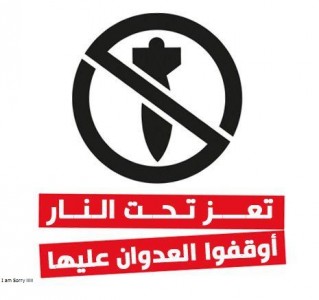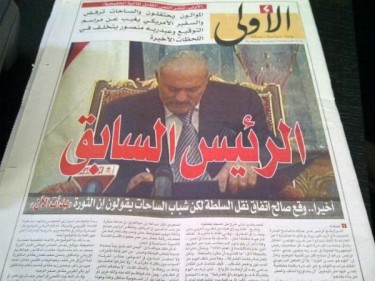2011 was a year of revolution in Yemen, characterized by massive peaceful marches that were seldom met with security forces’ brutality, subsequently leading to the ouster of Ali Abdullah Saleh after a 33-year rule. In exchange for immunity Saleh, transferred power to his deputy of 18 years Abdu Rabu Mansour Hadi, through a Gulf brokered deal, backed by the U.S , the U.N and the international community. On February 27th Hadi was appointed as president after a one man election.
Many Yemenis were discontented with this settlement yet after a long year of bloodshed, clashes and interrupted services they were eagerly longing for peace, security and stability and hoping for a smooth political transition. The year 2012, was far from that, it was a year of turmoil in Yemen. This year Yemen witnessed an unprecedented numbers of assassinations, kidnappings, car explosions, suicide bombings, attacks on electricity cables and gas pipelines, a deterioration of both the economic and humanitarian conditions, besides an increase in US drone attacks.
Throughout the year more than 60 Yemeni intelligence officers and military commanders were killed across the country, mostly in Sana’a and Aden, either by a car explosion or by unknown gunmen on a motorcycle. Although most of the killings were attributed to al-Qaeda, yet futile government investigations did not result into any findings.
The fragile security and lawlessness in Yemen led to an increase in kidnappings. In March, a Saudi diplomat, Abdallah al-Khalidi was kidnapped. A Swiss woman teacher was also captured in March in the portal city of Hodeida, both are still missing until today. In April, a French Red Cross aid worker was abducted and later released unharmed. In an unprecedented deterioration in Decemeber, an Austrian man and a Finnish couple were also kidnapped in broad daylight in the city center of the capital Sanaa.
Several attacks on the cables in the main electric supply station in Mareb left Yemen in the dark for several hours, sometimes days until the cable was repeatedly repaired. Tribal militia-men were suspected to be behind these recurrent attacks yet the government was too weak and the military too divided to secure those lines. The last month of December also witnessed the eighth attack on the LNG (Liquid Natural Gas) pipelines since the first sabotage on the line in October 2011. Repeated attacks this year limited the production of the gas and crippling the economy further. According to the Petroleum and Minerals Minister Hisham Abdullah, Yemen lost more than $4 billion (3.1 billion euros) in revenues since February 2011 due to such attacks.
The prolonged political crisis, lack of services, economic instability, rise in prices and unemployment were all factors which led to deepening the food crisis further which had already existed prior to the events of 2011. According to a recent report by UNICEF Yemen, about 60 percent of Yemeni children were chronically malnourished and about 15 percent – 257 thousand children under the age of five – suffer from acute malnourishment.
A sharp increase in US drone attacks was also noted this year, it rose to 53 from 18 in 2011. Not surprisingly since Yemen’s President Hadi himself, during his last visit to the US, praised these strikes and claimed their effectiveness. Yet many Yemenis condemn them and consider them a violation to Yemen’s sovereignty. Contrary to what the US administration wishes to believe these attacks have created animosity towards the US. Many Yemenis and Yemen experts have written extensively how the increase in US strikes has had an adverse reaction and has helped al-Qaeda grow in size. Gregory Johnsen, who wrote ‘The Last Refuge”, a book on Yemen and al Qaida in the Arabian Peninsula, in a recent interview said “Essentially what the U.S. is doing is bombing suspected AQAP targets in Yemen in the hopes that AQAP doesn’t bomb the U.S.,” he added “In my view, this is neither sustainable nor wise. We have seen AQAP grow incredibly fast in a remarkably short amount of time, expanding from 200-300 fighters in 2009, when the U.S. bombing campaign began, to more than 1,000 fighters today. That is more exacerbating and expanding the threat than it is disrupting, dismantling and defeating it.” Many Yemenis question why haven’t suspected targets been captured and prosecuted instead of being remotely eliminated, often killing civilians in the process. A further increase in drone strikes in 2013 is expected unless there is a miraculous change in the US counter-terrorism policy or Yemen's puppet government takes a firm stand and condemns these attacks.
One of the main demands of the popular youth revolution was the dismissal of Saleh’s relatives and former henchmen from top military and security command positions and the restructuring of the military. Hence President Hadi’s decrees to dismiss Saleh’s nephew, Yehya Saleh, head of the counter-terror unit and central security forces and to disband the Republican Guards headed by Saleh’s eldest son Ahmed and the First Armored Division headed by Ali Muhsin and reshuffling them into the central command of the defense ministry and restructuring the army into four components: ground forces, navy, air forces and border guards were widely celebrated and supported. Yet that jubilation did not last long, to the dismay of many, reports emerged that both Ahmed Saleh and Ali Muhsin would be offered senior positions in the new military restructure. “Fortunately, Brigadier General Ahmad Saleh seems to have agreed to be given the command of a military region in an institutional reshuffle,” said an editorial. The popular demand to purge the Salehs and Ali Muhsin from any military positions was apparently disregarded once more. This will certainly be a slap in the face to the revolution and will further anger the youth who marched again this year from Taiz to Sanaa (270km), commemorating the martyrs and reviving the demands of the first life march in 2011, which include removing these notorious leaders.
Yemen is currently preparing for a six-month National Dialogue Conference which had been faced with challenges and setbacks resulting in it's postponement several times. After a participating quota for the political parties and groups was finally reached, the conference is due to start sometime early next year, despite reports that some Southern secessionists are still boycotting the Dialogue. Although the UN envoy, Jamal Bin Omar before heading back to New York , reportedly, “urged all Yemeni parties to avoid any acts that may hinder the national dialogue and the progress of the political process in Yemen” yet the ousted president appears determined to participate in the upcoming National Dialogue. A press statement from the office of Ali Abdullah Saleh the head of the General People’s Congress, posted on the official website of the GNC party announced “ the leader (Saleh), will head the body of representatives of the GPC to the national dialogue conference.” Only in Yemen would an ousted president be granted an immunity and be allowed to participate in a national dialogue that would shape the future of the country and outline it’s new constitution. Speculations as usual about Saleh's upcoming trip and the destination he is headed to (Oman, KSA, Italy?) are currently surfacing once more in Yemen.
The volatile security situation that has plagued Yemen over the past year was
mainly to the weak military structure, and the divided and opposing military factions spearheaded by Ahmed Saleh and Ali Muhsin. Any military restructure that has these two leaders in it will recreate the same bloody scenario. Yemen’s security and stability requires their final removal from any military position and hence severing any loyalties to either side. The removal of Saleh from Yemen, and prohibiting him from playing any political role that can further destabilize the country is a crucial and crystal clear necessity now, which the GCC plan should have initially incorporated. The GCC, UN and the international community have an obligation now to rectify this grave miscalculation and hold Saleh and his loyalists accountable for Yemen’s instability in the past year and impose strict sanctions on them, not just empty threats. Yemen mostly needs the prompt delivery of the $6 billion that was pledged at the “Friends of Yemen” conference which is necessary to assist in it’s development through sustainable long term income generating projects and not in the form of short term aid.
The path is still long and arduous for Yemen, yet it’s youth are still peacefully calling for change and are determined to continue demanding what they originally set out to achieve - equal rights, liberty, freedom from oppression and a dignified life, which the team in SupportYemen had conveyed in this video at the beginning of the revolution:




